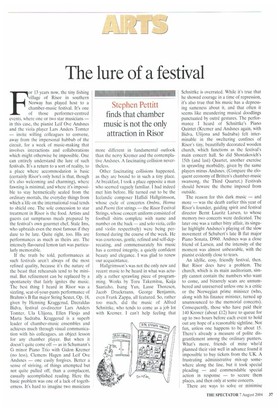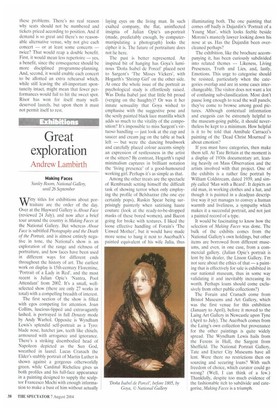The lure of a festival
Stephen Pettitt finds that chamber music is not the only attraction in Risor
For 13 years now, the tiny fishing village of Risor in southern Norway has played host to a chamber-music festival. It's one of those performer-centred events, where one or two star musicians — in this case, the pianist Leif Ove Andsnes and the viola player Lars Anders Tomter — invite willing colleagues to convene, away from the impersonal hubbub of the circuit, for a week of music-making that involves interactions and collaborations which might otherwise be impossible. One can entirely understand the lure of such festivals. It's a return to a sort of reality, to a place where accommodation is basic (certainly Risor's only hotel is that, though it's also welcoming and charming), where fawning is minimal, and where it's impossible to stay hermetically sealed from the ordinary mortals, the everyday things from which a life on the international road tends to shield one. The sole concession to star treatment in Risor is the food. Artists and guests eat sumptuous meals prepared by the festival's own gourmet chef, Stale Ims, who upbraids even the most famous if they dare to be late. Quite right, too. His are performances as much as theirs are. The intensely flavoured lemon tart was particularly memorable.
If the truth be told, performances at such festivals aren't always of the most refined quality, because it's the nature of the beast that rehearsals tend to be minima]. But refinement can be replaced by a spontaneity that fairly ignites the music. The best thing I heard in Risor was a sizzling, seat-of-your-pants performance of Brahms's B flat major String Sextet, Op. 18, given by Henning Kraggerud, Dzeraldas Bidva, festival co-director Lars Anders Tomter, Ula Ulijoria, Ellen Flesjo and Marta Sudraba. Kmggerud is a superb leader of chamber-music ensembles and achieves much through visual communication with his colleagues, an object lesson for any chamber player. But when it doesn't quite come off — as in Schumann's G minor Piano Trio with Gidon Kremer (no less), Clemens Hagen and Leif Ove Andsnes — one easily forgives. Better a sense of striving, of things attempted but not quite pulled off, than a complacent, casually accomplished reading. Here the basic problem was one of a lack of togetherness. It's hard to imagine two musicians more different in fundamental outlook than the nervy Kremer and the contemplative Andsnes. A fascinating collision nevertheless.
Other fascinating collisions happened, as they are bound to in such a tiny place. At breakfast, I took a place opposite a man who seemed vaguely familiar. I had indeed met him before. He turned out to be the Icelandic composer Haflidi Hallgrimsson, whose cycle of concertos Ombra, Herma and Poemi (for strings — the Risor Festival Strings, whose concert uniform consisted of football shirts complete with name and number on the back — and solo viola, cello and violin respectively) were being performed during the course of the week. He was courteous, gentle, refined and self-deprecating, and commensurately his music has a centred integrity, a quietly confident beauty and elegance. I was glad to renew our acquaintance.
Hallgrimsson's was not the only new and recent music to be heard in what was actually a rather sprawling piece of programming. Works by Toni Takemitsu, Kaija Saariaho, Isang Yun, Lasse Thoresen, Jacob Druckmann, George Benjamin, even Frank Zappa, all featured. So, rather too much, did the music of Alfred Schnittke, who tends to come as a job lot with Kremer. I can't help feeling that Schnittke is overrated. While it's true that he showed courage in a time of repression, it's also true that his music has a depressing sameness about it, and that often it seems like meandering musical doodlings punctuated by outré gestures. The performance I heard of Schnittke's Piano Quintet (Kremer and Andsnes again, with Bidva, Ulijona and Sudraba) felt interminable in the sweltering confines of Risor's tiny, beautifully decorated wooden church, which functions as the festival's main concert hall. So did Shostakovich's 15th (and last) Quartet, another exercise in sprawling morbidity, given by the same players minus Andsnes. (Compare the eloquent economy of Britten's chamber-music swansong, the Third Quartet.) Festivals should beware the theme imposed from outside.
The reason for this dark music — and more — was the death earlier this year of Risor's founder, guiding spirit and festival director Bernt Lauritz Larsen, to whose memory two concerts were dedicated. The later one was a rather bitty affair, its singular highlight Andsnes's playing of the slow movement of Schubert's late B flat major Piano Sonata, D960. Andsnes was a close friend of Larsen, and the intensity of the moment was almost unbearable, with the pianist evidently close to tears.
An idyllic, cosy, friendly festival, then. But Risor does have a problem. The church, which is its main auditorium, simply cannot contain the numbers who want to come, and bizarrely seats are unnumbered and unreserved unless one is a critic or the Norwegian prime minister (who, along with his finance minister, turned up unannounced to the memorial concerts). Consequently, those who have paid their 140 Kroner (about £.12) have to queue for up to two hours before each event to hold out any hope of a reasonable sightline. Not fun, unless one happens to be about 15. There's already a measure of polite disgruntlement among the ordinary punters. What's more, friends of mine who'd planned their visit well in advance found it impossible to buy tickets from the UK. A frustrating administrative mix-up somewhere along the line, but it took special pleading — and commendable special action in response — to secure them places, and then only at some concerts.
There are ways to solve or minimise these problems. There's no real reason why seats should not be numbered and tickets priced according to position. And if demand is so great and there's no reasonable alternative venue, why not give each concert — or at least some concerts — twice? That would reap a double benefit. First, it would mean less repertoire — yes, a benefit, since the consequence should be more disciplined programme-planning. And, second, it would enable each concert to be allotted an extra rehearsal which, while still leaving the ail-important spontaneity intact, might mean that fewer performances would fail to hit the sweet spot. Risor has won for itself many welldeserved laurels, but upon them it must not permit itself to rest.



























































 Previous page
Previous page